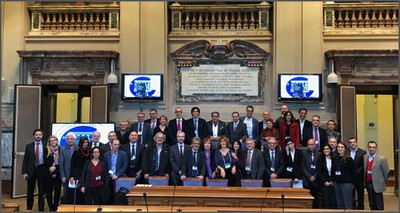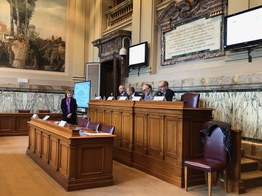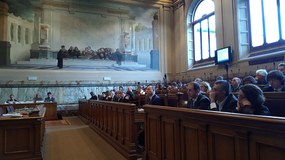Energy: ENEA at the forefront with the IEA for the decarbonisation of the energy system
19/12/2019
 ENEA and RSE organised the first national meeting in the last few weeks, gathering Italian delegates in the 22 Technology Collaboration Programmes (TCP), the multilateral R&I initiatives of the International Energy Agency (IEA) advancing the research, development and commercialisation of energy technologies and contributing to a more sustainable and secure global energy system.
ENEA and RSE organised the first national meeting in the last few weeks, gathering Italian delegates in the 22 Technology Collaboration Programmes (TCP), the multilateral R&I initiatives of the International Energy Agency (IEA) advancing the research, development and commercialisation of energy technologies and contributing to a more sustainable and secure global energy system.
The aim of the event was to discuss and detect IEA TCP linkages to the Italian National Energy & Climate Plan (NECP) and analyse the interaction with other related European, national and regional initiatives, so coordinating efforts on research and development of the most promising techniques for energy transition in Italy.
IEA Partnerships and Innovation Counsellor in the Strategic Initiatives Office, Simone Landolina, gave an overview of IEA Technology Collaboration Programme and a snapshot of the IEA Sustainable Development Scenario underlining the contribution of all technologies as well as of multilateral cooperation to the clean energy transition.
 Luca Sabbatucci, DG for Globalisation, Italian Ministry for Foreign Affairs and International Cooperation, underlined the importance of TCPs - unique mechanism of multilateral cooperation with its 40 years of existence - in the global energy landscape that he always sustained in his role of Italian Governing Board representative.
Luca Sabbatucci, DG for Globalisation, Italian Ministry for Foreign Affairs and International Cooperation, underlined the importance of TCPs - unique mechanism of multilateral cooperation with its 40 years of existence - in the global energy landscape that he always sustained in his role of Italian Governing Board representative.
ENEA represents Italy in 15 TCP Executive Committees out of the 22 TCPs, on end use, renewables and advanced techniques for supply of energy from fuels.
Gian Piero Celata, director of ENEA Energy Technology Department, reminded: “ENEA carries on investing in the IEA collaborative research with over 20 experts engaged. Moreover we recently entered the management board of the industry programme that deals with conversion and energy optimisation, deep decarbonisation in energy intensive industries, and digitalisation for optimised processes: these are all primary concerns in Italy”.
 Celata added: “According to the ENEA’s survey on Italian participation in TCPs, presented and discussed today, the engagement from industry and decision makers is still weak. A more systemic approach is needed, with ENEA having a strategic role in national official panels for decarbonisation and innovation. The Energy Cluster, for example, can promote the dialogue between the world of research and local key actors, leveraging exploitation of higher TRL[1] technologies and supporting R&D on lower TRL ones.
Celata added: “According to the ENEA’s survey on Italian participation in TCPs, presented and discussed today, the engagement from industry and decision makers is still weak. A more systemic approach is needed, with ENEA having a strategic role in national official panels for decarbonisation and innovation. The Energy Cluster, for example, can promote the dialogue between the world of research and local key actors, leveraging exploitation of higher TRL[1] technologies and supporting R&D on lower TRL ones.
“With regard to energy efficiency techniques for the transition, new TCP projects are studying resilient cooling to withstand thermal and other impacts of changes in global and local climates, and the capacity of buildings to adapt to the grid’s and the user’s needs”, says Ezilda Costanzo , ENEA researcher and delegate in the IEA End Use Working Party, who also recaps the new focus on smart districts where investigation on electric vehicles and system integration is key.
“To decarbonise the national energy system based on the Italian NECP scenarios, R&D on hydrogen is extremely important since this unique carrier gas is able to improve grids flexibility and energy storage capacity, finally states Simona De Iuliis, ENEA, Italian CERT delegate.
ENEA and RSE finally committed for follow-ups of the day to support the Italian Ministry of Economic Development, in charge for coordinating the Italian participation in IEA TCPs, to improve the collaboration mechanism and establish synergies and cross-cutting opportunities.
For more info:
Ezilda Costanzo, ENEA Energy Technology Department , ezilda.costanzo@enea.it
